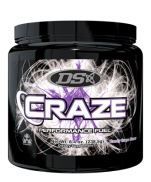Workout Supplement, 'Craze,' Contains Meth-Like Ingredient Not Listed On Label

A team of researchers have discovered that Craze, a body-building supplement produced by Driven Sports, Inc., contains a stimulant that is not listed as an ingredient, is untested for human use, and is similar to methamphetamine. The laboratory study of the powder supplement was conducted at Harvard Medical School and National Institute for Public Health and the Environment Health Protection in the Netherlands.
“If our findings are confirmed by regulatory authorities, the FDA should take immediate action to warn consumers and remove all N,alpha-DEPEA-containing supplements from the marketplace,” wrote the authors in the study.
Unlisted, Untested…Unethical?
“Imagine having something available that helps you train BEYOND YOUR LIMITS. Imagine seemingly endless energy.” So claims the company’s website for Craze, which lists over 10 ingredients, including, most prominently, creatine monohydrate, a popular additive in supplements to help build muscle mass. Although creatine monohydrate cannot be considered a U.S. Food and Drug Administration (FDA)-“approved” substance — the FDA does not regulate supplements in the same way it would food or drugs — the agency has posted a fact sheet about creatine, as contained in a particular product, on its website suggesting it is safe. Other listed ingredients include naturally occurring substances and vitamins.
The authors conducted their laboratory study of Craze after making purchases from both online retailers as well as brick-and-mortar stores. The two separate labs independently identified the same ingredient, N,alpha-DEPEA, referred to by the authors as "a potentially dangerous designer drug," which was not listed on the label, although it does list several phenylethylamines claiming to be derived from dendrobium, a type of plant related to orchids. "Phenylethylamines include a very broad category of chemicals that range from benign compounds found in chocolate to synthetically produced illicit drugs," wrote the authors.
“What’s particularly alarming about finding a completely new drug, in this case a close cousin of methamphetamine, is that we have no idea how it will affect the body,” the lead study author, Pieter Cohen, M.D., of the Harvard Medical School, told Consumer Reports. “Will it be addictive? Will it stimulate the heart and increase the risk of heart attacks?”
Craze is intended to be taken in doses of between 5.3 grams and 10.6 grams; the manufacturer suggests adding one to two scoops of the powder to 8 to 16 ounces of cold water. The U.S. Anti-Doping Agency categorized Craze as "high risk" after testing a sample from one lot and finding prohibited stimulant substances. The company’s website, accessed today, lists the product as “currently out of stock.”



























